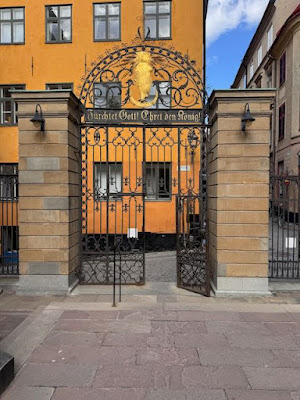OFD's goal for the day was twofold: go to the island to see the Palace and Old Town, and Food. This post is about Gamla Stan or Big Square in Old Town Stockholm. She had researched the public transport system and bought an all-day ticket for the three of us. Thanks to modern technology, all the maps and info were on her phone, so as long as we stayed with her, all would be well.
Gamla Stan is the original Stockholm. It's Stockholm's oldest settlement with many historical buildings and attractions. It has a population of around 3,000 people.
The town dates back to the 13th century, and consists of medieval alleyways, cobbled streets, and archaic architecture. -Wikipedia
We got to the island early, before all the tour buses and tourists. Shop owners were setting out their pots of flowers, tables and chairs for sidewalk refreshments.
Cars are banned in inner Gamla Stan. There were delivery vans out and about, maneuvering on and through the narrow streets.
The Northern Gate to The German Church, named for standing in the center of a neighborhood that in the Middle Ages was dominated by Germans. The gilded patron saint (St. Gertrude) is over the gate. "Fear God! Honour the King!".
German Church or St. Gertrude's Church
The German guild of St. Gertrude was founded on the location for the present church in the 14th century. While the guild was created by German merchants, their Swedish counterparts were often invited to take part in its activities. - Wikipedia
The headquarters of the guild was gradually rebuilt into a church starting in the 1580s. - Wikipedia
Services in German are still held every Sunday at 11 am, and the church is open daily during the summer and at weekends during the winter. The church was not open when we checked the doors. The interior is Baroque in style, according to Wikipedia, and has a king's gallery.
The sandstone Southern Portal is flanked by Jesus on the left, representing the New Testament, and Moses on the right, representing the Old Testament. The statues were cut in 1640.
By 1800, the German congregation had dwindled to a mere 113 people, and in 1878 a fire destroyed the tower. Today the German parish sorts under the Church of Sweden but as a so-called non-territorial parish, the approximately 2,000 members of which are found all around Stockholm. - Wikipedia
The brick steeple and the copper-covered spire, together 96 metres tall, were completed in 1878. - Wikipedia
birdhouse geocache
fabric bow decorating a door
The medieval heart of Gamla Stan is Stortorget, meaning the 'Big Square'. This is the Stock Exchange Building (Börshuset), which houses the Swedish Academy, the Nobel Museum, and the Nobel Library. Designed by Erik Palmstedt and built 1773–1776. - Wikipedia
The square started as a junction in which the tracks that criss-crossed the island converged. By 1400, the city had some 6,000 inhabitants, and stone buildings started to be built around the square. Its merchants and the well on the square made it a natural meeting place. As the Germans long had a very important presence in Stockholm, the city council was composed by an equal number of Swedish citizens and German immigrants. Merchants, all burghers, dominated the assembly; craftsmen were occasionally entrusted minor commissions. The remaining citizens were entirely excluded from any influence. Stockholm was a one-horse town, compared to splendid Continental European cities. - Wikipedia
Every square has a fountain, which was originally a well. It dried up in 1856 due to land elevation.
Today, it is connected to the city's water system.
Stortorget is surrounded by pastel-coloured merchants' homes. This was where the famous bloodbath of Stockholm took place in 1520, when close to 100 aristocrats were executed. - Wikipedia
interesting flowers lining Stortorget
Sweden, home of the Dala horse,
Dala refers to the Swedish province of Dalarna (Dalecarlia) where it is said the carved horse originated.
The Dala Horse is stoutly carved and was traditionally painted iron oxide red at first. Now it is usually reddish orange with details and a harness in white, green, yellow and blue. The Dala horse of today is still a handcrafted article, made of pine, and its pattern is about 150 years old. At least nine different people contribute their skills to create each horse. - Wikipedia
By noon, many more people were visiting Gamla Stan.
Next, The Royal Palace.

























No comments:
Post a Comment
Thanks for your comments!